
Konkani is an Indo-Aryan language spoken by the Konkani people, primarily in the Konkan region, along the western coast of India. It is one of the 22 scheduled languages mentioned in the Indian Constitution, and the official language of the Indian state of Goa. It is also spoken in Karnataka, Maharashtra, Kerala, Gujarat as well as Damaon, Diu & Silvassa.

Govind Mishra is an Indian novelist, who has written more than 53 books. He was also a civil servant with Indian Revenue Service (IRS) and retired as Chairperson, Central Board of Direct Taxes in 1997. Over the years, he has written 11 novels, 14 short story collections, five travelogues, five literary essays collection, a poem collection and 2 story books for children.
The Saraswati Samman is an annual award for outstanding prose or poetry literary works in any of the 22 languages of India listed in Schedule VIII of the Constitution of India. It is named after the Hindu goddess of knowledge, Saraswati.
Balakrishna Bhagwant Borkar commonly referred to as Bakibab Borkar, also known as Bā Bha Borkar, or Ba-ki-baab was an Indian poet. He started writing poems at an early age. The author Vi SA Khandekar was an early champion of Borkar's poetry. Borkar joined Goa's fight for freedom in the 1950s and moved to Pune, where he worked for the radio. Most of his literature is written in Marathi, though his Konkani output is also considerable. He excelled as a prose writer as well. His long poems Mahatmayan, an unfinished poem dedicated to Gandhi), and TamaHstotra are famous. One of his famous poems is "Mazha Gaav", meaning "My village". After Borkar's death, Pu La Deshpande and his wife Sunitabai performed public readings of Borkar's poetry.
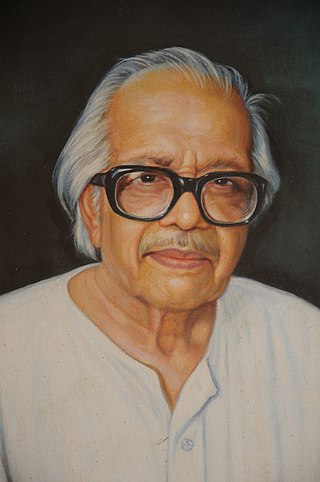
Ravindra Kelekar was an Indian author who wrote primarily in the Konkani language, though he also wrote in Marathi and Hindi. A Gandhian activist, freedom fighter and a pioneer in the modern Konkani movement, he was a well known Konkani scholar, linguist, and creative thinker. Kelekar was a participant in the Indian freedom movement, Goa's liberation movement, and later the campaign against the merger of the newly formed Goa with Maharashtra. He played a key role in the founding of the Konkani Bhasha Mandal, which lead the literary campaign for the recognition of Konkani as a full-fledged language, and its reinstatement as the state language of Goa. He authored nearly 100 books in the Konkani language, including Amchi Bhas Konkaneech, Shalent Konkani Kityak, Bahu-bhashik Bharatant Bhashenche Samajshastra and Himalayant, and also edited Jaag magazine for more than two decades.

Uday Laxmikant Bhembre is an Indian lawyer, Konkani writer and politician who is a former member of the Goa, Daman and Diu Legislative Assembly. He is noted for his role as the editor of the Konkani daily, Sunaparant, and as a Konkani language activist. Bhembre is also widely known as the lyricist of the famed Goan Konkani language song Channeache Rati.

Basti Vaman Madhav Shenoy was an Indian Konkani activist, popularly known as "Vishwa Konkani Sardar" and was the founder of World Konkani Centre in Shakthinagar, Mangalore.
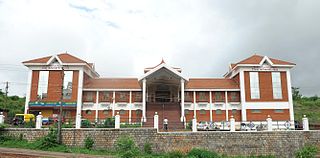
World Konkani Centre was founded by Konkani Bhas Ani Sanskriti Prathistan at Konkani Gaon, Shakti Nagar, Mangalore, to serve as a nodal agency for the preservation and overall development of Konkani language, art and culture involving all the Konkani people the world over.

Konkani in the Roman script, commonly known as Roman Konkani or Romi Konknni refers to the writing of the Konkani language in the Roman script. While Konkani is written in five different scripts altogether, Roman Konkani is widely used. Roman Konkani is known to be the oldest preserved and protected literary tradition beginning from the 16th century AD.
Manohar Rai Sardesai was an Indian Konkani poet, writer and French translator. He received his Doctorat ès lettres françaises for his thesis "L'image de l'Inde en France" from the University of Sorbonne. He has been credited for an upsurge of modern Konkani poetry. Sardesai died in 2006.
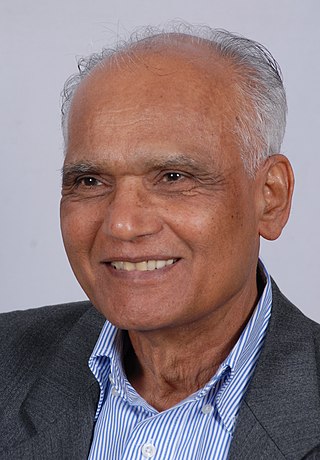
Santeshivara Lingannaiah Bhyrappa is an Indian novelist, philosopher and screenwriter who writes in Kannada. His work is popular in the state of Karnataka and he is widely regarded as one of modern India's popular novelists. His novels are unique in terms of theme, structure, and characterization. He has been among the top-selling authors in the Kannada language and his books have been translated into Hindi and Marathi which have also been bestsellers.

Sumathendra Raghavendra Nadig was an Indian professor and writer in Kannada. Nadig came upon the literary scene as a prominent modern poet in the 1960s. He was a close associate of Gopalakrishna Adiga, the leader of the modernist movement.
The Konkani language agitations were a series of protests in India, concerning the uncertain future of the Konkani language. They were held by Goans in the former territory of Goa, Daman and Diu; then under the administration of the Maharashtrawadi Gomantak Party (MGP). The protests involved citizen journalism, student activism & political demonstrations. The civil unrest ceased when premier official status for Konkani in the Devnagari script was granted. Marathi was declared an associate official language of Goa.
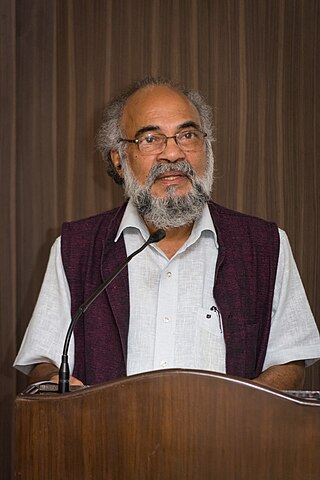
Pundalik Narayan Naik is an Indian Konkani poet, short-story writer, novelist, playwright, and screenwriter. He has 40 books and two films to his credit.
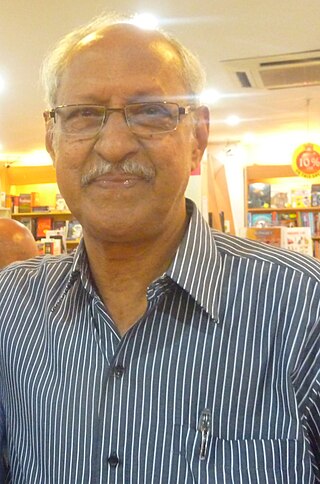
Damodar Mauzo is an Indian short story writer, novelist, critic, and screenwriter in Konkani. He was awarded the 57th Jnanpith Award, India's highest literary honour, in 2022, Sahitya Akademi Award in 1983 for his novel Karmelin and the Vimala V. Pai Vishwa Konkani Sahitya Puraskar award for his novel Tsunami Simon in 2011. His collection of short stories Teresa's Man and Other Stories from Goa was nominated for the Frank O'Connor International award in 2015. He has served as a member of the executive board, general council, as well as the finance committee of the Sahitya Akademi.
Narayana Purushothama Mallaya is an Indian author, known for his activism for Konkani language and literature. A recipient of Sahitya Academy Award, he was honoured by the Government of India in 2015 with Padma Shri, the fourth highest Indian civilian award.

Konkani literature is literature in the Konkani language, mostly produced in three scripts: Roman, Devanagari and Kannada. Konkani literature is eligible for the Sahitya Akademi Award.

Jayanti Naik is an Indian Konkani writer, folklore researcher, short story writer, dramatist, children's writer, folklorist, and translator. She was the first person to earn a doctorate from the Goa University's Department of Konkani. She is also a recipient of the Sahitya Akademi Award. In her career of some three decades, she has produced on average, a book a year.

Ramesh Bhagvant Veluskar was an Indian Konkani poet and litterateur. He died on 21 October 2018 at Raebareli, Uttar Pradesh.

Hema Naik is an Indian Konkani writer. She is a recipient of the Sahitya Akademi Award and is the wife of the Konkani writer Pundalik Naik. She publishes books under the banner of Volvoi-based Apurbai Prakashan.














